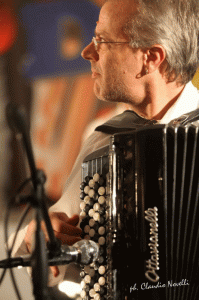 Giordano Giannarelli majored in accordion, instrument which has “investigated” in different variations and across multiple musical styles. In the eighties, he has mainly dedicated to dance music, becoming part of prestigious ensemble in the sector, such as those of G. Gherardelli and I. Nicolucci, and forming, together with three other musicians, the Gruppo Italiano. In this same period, he participates in the implementation of various recording projects, as an arranger, composer and session musician. In the nineties Giannarelli devoted to other musical genres, founding also modern and pop music groups, where he plays trumpet, keyboards, and various electronic equipment. In parallel with these more commercial activities, he develop an important concert career that brings him to play in Italy and abroad and at the same time participates in the creation of records by artists such as Tanita Tikaram, Eros del Silencio, Vince Vallicelli, Orchestra RAI, Pacio Almez, Circus du Soleil.
Giordano Giannarelli majored in accordion, instrument which has “investigated” in different variations and across multiple musical styles. In the eighties, he has mainly dedicated to dance music, becoming part of prestigious ensemble in the sector, such as those of G. Gherardelli and I. Nicolucci, and forming, together with three other musicians, the Gruppo Italiano. In this same period, he participates in the implementation of various recording projects, as an arranger, composer and session musician. In the nineties Giannarelli devoted to other musical genres, founding also modern and pop music groups, where he plays trumpet, keyboards, and various electronic equipment. In parallel with these more commercial activities, he develop an important concert career that brings him to play in Italy and abroad and at the same time participates in the creation of records by artists such as Tanita Tikaram, Eros del Silencio, Vince Vallicelli, Orchestra RAI, Pacio Almez, Circus du Soleil.
When did you start and how it has changed the scenario of the accordion in recent years?
I must confess that the creator of all was my father, who also directed me to this instrument. Indeed, at this age (about 8 years) I expressed interest in music, but I was not able to make a choice of instrumental address. I remember I saw an accordion, or rather my father made sure to show me, taking me in a store, I was fascinated by the form, the harmony of the structure, perhaps even the complexity and the desire to find out what hid all those buttons… I mean it was more an imprinting that a real choice.
The Accordion, both from the academic point of view that diffusion, has lived and still live constantly developing and updating scenarios. It’s young age allows us to be builders, sometimes even unknowingly, of discoveries and applications that only a few years ago were unworkable. An example of this is the insertion of the instrument into the conservatory, which is, compared to other instruments, recently implemented. I started to study it when it was not yet official, adapting path over the years, because of this fundamental evolution.
What about the Italian music scene and especially the space that this reserve to the music for accordion?
I do not believe that the Italian music scene has to worry about creating spaces reserved for an instrument rather than another; if we take into account the commercial music, for example, it employs and uses sounds that change as a function of different ages, fashions, market research etc. There are periods when you are using sax rather than violin, or the period you play more piano rather than a flute. For some years, for example in commercial dance music (disco music for instance) the use of the accordion is massive and almost annoying to use sometimes outrageous: DJ Antoine, Shakira, all the African dance in general, abuse of this tool, but why? certainly not for a propensity to the rediscovery of the instrument, nor a devotion to teaching… it works from the commercial point of view, that’s all, a little as the sax that worked in the same vein in the eighties and nineties. The Italian music scene is varied and diverse, there is pop music, but there is also the folk and then there are the traditions of dance music, the songwriting, that niche, interesting events dedicated to jazz, classical, variety show, etc., for a good accordionist there are many possibilities, it is important not to become fundamentalists. Space and opportunity to discover, experiment and grow on several fronts: the accordion is a very young instrument that has a history still too short to impose law in a commercial or accredited use, we must be able to grow with it to be regarded accordionists.
Through your experience abroad have you recognized more favorable and attentive environments for the accordion?
It depends on the area. Eastern countries are very attentive to the educational growth of the instrument with excellent results by the students and, consequently, by the players who will then overlook the music scene, as a source of income, but with considerable difficulty. I found a lot of interest to the instrument in the Scandinavian countries, where there are many accordion players and also many Italian accordion; in South America they sounds so much more for fun than for work… Where there’s one thing another one is missing, there is no job more suitable to the musician for fully understand globalization.
What were the basic steps of you career?
This is a question that allows me to be very brief: curiosity. And it is also the advice that I prefer to give to those who want to face their own history as a professional musician.
The education has an important role in the formation of a musician?
Teaching is important but it should not become a castration. It often happens that you have to deal with musicians (teachers) who, because of their psychology, induce a must, thanks to the secrets of the trade, priests exclusive of their art. In fact, in my opinion, the music is not meant for only those who know the writing and has studied the technique. The creativity and talent are fertile ground on which to cultivate theoretical or instrumental techniques, the trainer must be able to grasp the clues and transfer knowledge and teaching wisdom and expertise.
How does your experience as a teacher enriches your music?
I learn a lot from my kids. Sometimes I experience in the field their thoughts and their ideas, it can also happen that the music lesson becomes a confrontation of opinions, joint research, it is very constructive to be a trainer when you are experiencing these complicity.
What are your commitments or your projects?
I work as a trainer at the Forlì “Music Academy” (www.cosascuola.it), where, in addition to my role as a teacher, I organize master, seminars, workshops, discussions, etc. My main activity, however, is still that of “musician”. I do it for many years and I have always tried not to miss anything, I would call an “explorer” of sorts. Currently, in addition to an orchestral activity, say more commercial, I propose concerts where I associate the accordion at the piano, guitar, or wind instruments. These are concerts of great emotional impact, in which I propose my songs and and jazz or contemporary tracks. I often work in recording studios as a session musician, I write for both pop music for accordion and commercial. I entered, supported by my friend and colleague Luca Medrano, teaching the accordion within the network Music Academy, known primarily targeted to modern music. The work has had considerable success, to the point that, most probably, will be certify, also with recognized documentation, the trail of the guys that follow the course of the accordion in this academy.
Can you talk about the project Synchronie?
Synchronie was a lucky and smart design that combined cleverly accordion within a path of musical genres. The common thread was, in fact, the accordion and styles. It consists of adaptations of songwriting songs, soundtracks, accordion songs in a frame in which there is a singer, a pianist and a narrator. The project, for its originality, also received an award in the celebrations of Tuscany Festival, sponsored by a number of municipalities in the region, as well as by the Ministry of Cultural Heritage and Activities, Cultural Tuscany Region, Department of Culture, Department of Entertainment, University of Pisa and other entities. Synchronie was the first name that we decided to give to this project, but at the same time is also the title of a concert piece for accordion that I wrote specifically for this project, where the synchronicities, in this case rhythmic and harmonic, are the primary feature of the song.
On the sidelines, I would like to mention two important steps in my career as a musician. The first is a recent experience made in the field of dance music, I was very gratified. In fact, from 2009 to 2011 I was part of the historic orchestra “Bourgeois”. I think the music of Maestro V. Bourgeois, who prior to this experience I had never done, has a particular thickness, worthy of note. Maybe he is one of the few artists who has been able to use the dance hall and dance music as a means to spread quality and capacity. Today the orchestra Borghesi no longer exists, unfortunately the steamroller that crushes the thick of things has also affected this reality, in my view, a serious loss in the Italian cultural scene.
The second experience relates to the tango. In 2008 I published a tango concert with the music publishing “the prè” entitled “Tanghitudine” and a year later, to my great satisfaction, the song was chosen and performed by the Orchestra of the Teatro Stabile of Buenos Aires during the opening of the International Year of the tango. This beautiful and exciting experience as a composer I think it has helped to count me among the candidates for the Lifetime Achievement Award, which I received in March 2011 in Castelfidardo, birthplace of the accordion.
Questo post è disponibile anche in: Italian

 English
English Italiano
Italiano 





Leave a comment
You must be logged in to post a comment.